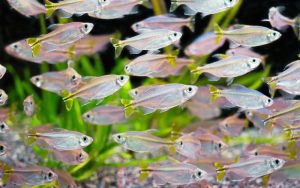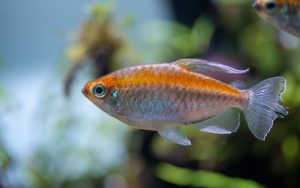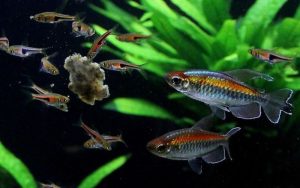Have you ever wondered about the dietary habits of ghost shrimp? These fascinating creatures, known for their translucent bodies and unique burrowing abilities, are often kept as pets in aquariums. But are ghost shrimp poop eaters?
While they may seem harmless and beneficial to the ecosystem, one aspect of their behavior raises some concern: their appetite for poop.
That’s right, ghost shrimp are rumored to be poop eaters, and today, we’re diving deep into this topic to uncover the truth.
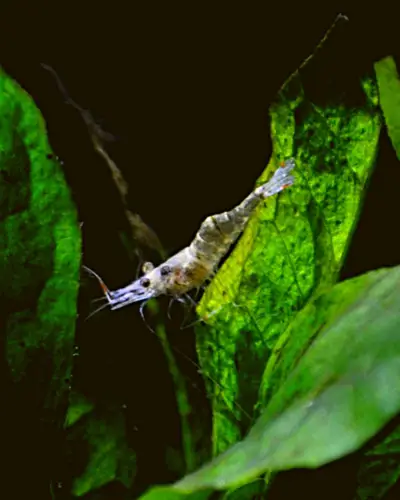
In this blog post, we’ll explore the intriguing world of ghost shrimp and their alleged affinity for poop. We’ll discuss the potential negative impacts this behavior can have on aquariums and the delicate balance of aquatic ecosystems.
But before we delve into the downside, let’s look at what ghost shrimp are and why they’ve gained popularity among aquarium enthusiasts.
So, if you’re curious about the mysterious world of ghost shrimp and their poop-eating antics, keep reading to discover the hidden truths beneath the surface.
Table of Contents
ToggleAre Ghost Shrimp Poop Eaters?
Do ghost shrimp eat fish poop? Ghost shrimp are not poop eaters. They are omnivores creatures and will eat various foods, including algae, plant matter, uneaten fish food, and even small insects.
However, they will not eat fish poop. Fish poop is not nutritious for shrimp and can harm their health. If a shrimp does eat fish poop, it will likely spit it out.
Ghost shrimp help keep an aquarium clean but are not the best solution for removing fish poop.
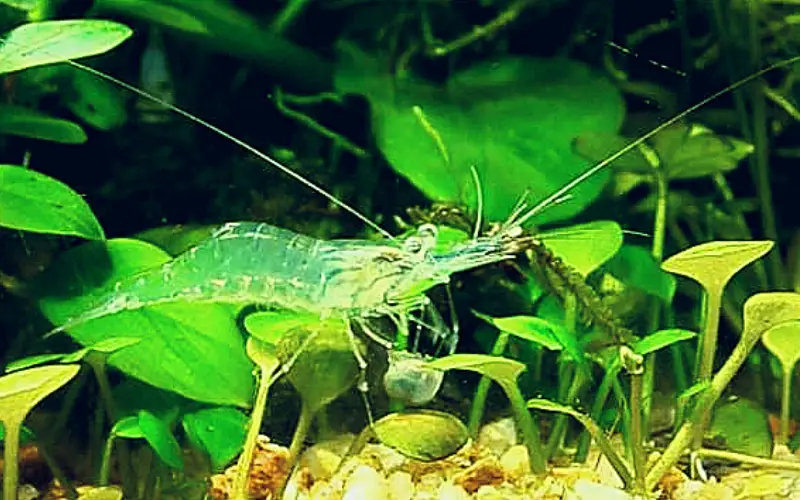
If you want to reduce the amount of fish poop in your tank, you may want to consider adding a pleco or other bottom-feeding fish. Plecos are designed to eat algae and other debris from the bottom of the tank, including fish poop.
Here are some other things you can do to reduce the amount of fish poop in your tank:
- Feed your aquarium fish the correct amount of food. Overfeeding is a major cause of fish poop.
- Remove uneaten food from the tank regularly.
- Use a fish tank gravel vacuum to regularly clean the bottom of the tank.
- Add live plants to the tank. Live plants help absorb nutrients and reduce algae growth, leading to less fish poop.
Following these tips can help keep your aquarium clean and healthy without relying on ghost shrimp to eat fish poop.
An In-depth Exploration of Ghost Shrimp’s Role as Aquarium Cleaners
Ghost shrimp (scientifically known as Palaemonetes paludosus) have long intrigued aquarium enthusiasts with their scavenging behaviors and peculiar eating habits. Are ghost shrimp poop eaters?
This question has sparked curiosity among aquarists and those venturing into aquarium keeping. In this definitive article, we will explore the intriguing world of ghost shrimp, their role as aquarium cleaners, their unique behaviors, and the potential negative impacts they might bring to your aquatic ecosystem.
The Scavengers of the Aquarium World
Are Ghost Shrimp Poop Eaters? Yes, ghost shrimp are indeed poop eaters, among other things. These tiny crustaceans play a crucial role in maintaining the cleanliness of your aquarium.
Ghost shrimp are natural scavengers whose diet consists of various organic matter, including leftover food, detritus, and decaying plants. This scavenging behavior extends to consuming fecal matter, including fish waste and shrimp poop.
3 Negative Impacts of Ghost Shrimp Poop Eating
While ghost shrimp contribute significantly to the overall health of your aquarium, their poop-eating behavior can have certain drawbacks. Here are three potential adverse impacts to consider:
- Altered Water Parameters Ghost shrimp’s continuous foraging for organic matter, including poop, can increase ammonia levels in the tank. Ammonia is harmful to aquatic life and can adversely affect water quality. Despite their beneficial scavenging habits, an excessive population of ghost shrimp can inadvertently disrupt the delicate balance of your aquarium’s ecosystem.
- Competing for Food Ghost shrimp’s affinity for scavenging extends to other food sources, such as sinking pellets and leftover fish food. This scavenging behavior might lead to competition for food with other tank inhabitants, particularly bottom feeders like catfish or loaches. If not monitored, this competition could lead to malnutrition for certain species.
- Impact on Live Plants While ghost shrimp contribute positively by consuming dead and decaying plant matter, they might also nibble on live plants. This can be problematic for aquarium enthusiasts who maintain elaborate aquatic plant layouts. Ghost shrimp’s voracious appetite for algae and plant matter might damage delicate or decorative plants.
Do Freshwater Shrimp Eat Poop?
Freshwater shrimp are known to eat a variety of organic matter, including decaying plant material, algae, and even poop. While it may seem distasteful, shrimp eat poop as part of their natural diet to obtain nutrients.
They serve as a natural cleaner in freshwater ecosystems, scavenging and removing decaying matter from the environment. With their shovel-like mouth parts, these shrimp efficiently scoop up and consume the detritus, ensuring a cleaner and healthier habitat.
Additionally, their consumption of algal growth helps regulate the ecosystem’s balance. Freshwater shrimp are often regarded as an essential part of the cleanup crew, tirelessly working to maintain their environment’s cleanliness and overall health.
Is Fish Poop Good for Ghost Shrimps?
Ghost shrimps are known to enjoy consuming fish waste, including poop. Fish waste contains ammonia, which can harm aquatic creatures if not adequately metabolized.
However, ghost shrimps can tolerate small portions of ammonia and even convert it into a more stable nitrogen compound. This makes them highly efficient at removing waste from the aquarium and maintaining water quality.
In addition to fish poop, ghost shrimps eat other organic matter types, such as algae. They play an essential role in keeping the tank clean and balanced by consuming leftover food, residue, and excess alga, making them valuable to any aquarium ecosystem.
Do Ghost Shrimps Eat Algae?
Ghost shrimps are omnivorous creatures that consume a variety of food sources, including algae. Algae provides them with essential nutrients and is a primary food source for these bottom feeders. Ghost shrimps have a unique feeding mechanism that uses their front appendages to sift through the substrate, devouring detritus or algae.
Their ability to remove algae efficiently helps maintain a balanced ecosystem within an aquarium or pond. Additionally, ghost shrimps’ feeding habits contribute to maintaining clean and clear water, as they remove excess nutrients produced by the decaying alga.
Therefore, it can be established that ghost shrimps eat algae and play a beneficial role as algae eaters in aquatic environments.
Do Ghost Shrimps Eat Plants?
Ghost shrimps, also known as glass shrimps, are freshwater crustaceans that can be found in aquariums. These shrimp are omnivorous, meaning they eat both plants and small organisms.
While ghost shrimps primarily feed on algae, they may also nibble on decaying organic matter and plant matter. However, it is essential to note that ghost shrimps do not solely rely on plant-based food sources.
They have a scavenging behavior, eating detritus, including dead plants and poop. This scavenging behavior helps maintain the overall cleanliness of the aquatic environment. So, while ghost shrimps do eat plants, they also have a varied diet that includes algae, decaying matter, and even poop.
What do Ghost Shrimps Eat in the Wild?
In the wild, ghost shrimps are known to be omnivorous creatures. They have a varied diet that includes both plant matter and small organisms. Ghost shrimps feed on shrimp larvae, tiny algae, and dead plant material.
They are also considered scavengers, as they eat decaying matter and organic detritus in their natural habitat. Their ability to consume various food sources allows them to adapt and survive in different ecosystems.
Ghost shrimps play a vital role in maintaining the balance of their aquatic environments by consuming decaying matter and helping with nutrient cycling.
Commonly Asked Questions About Do Ghost Shrimp Eat Fish Poop (FAQs)
What are the negative impacts of ghost shrimp poop eating?
There are some negative impacts associated with this behavior. Firstly, they do not eat all types of fecal matter, such as the waste of betta fish or cichlids. Therefore, if you have these species in your tank, the ghost shrimp won’t be able to keep the tank clean.
Are ghost shrimp the only species of shrimp that eat fish poop?
No, ghost shrimp are not the only species of shrimp that eat fish poop. Other shrimp species, like bamboo and cherry shrimp, also consume fecal matter in aquariums.
Can ghost shrimp eat anything other than fish poop?
Yes, ghost shrimp are omnivores and can eat a variety of foods. They will consume algae, leftover fish food, decaying plants, and small invertebrates like tiny worms or insect larvae.
Do ghost shrimp eat their own feces?
No, ghost shrimp typically do not eat their own feces. They primarily feed on other sources of food available in the tank.
What other types of food can be given to ghost shrimp as a supplement?
Ghost shrimp can be fed various foods to supplement their natural foraging. Some popular options include blanched vegetables like zucchini or spinach, small pieces of fish or shrimp, brine shrimp, and specially formulated shrimp pellets.
Can ghost shrimp survive solely on fish poop?
While ghost shrimp may eat fish poop as a food source, it is not enough to sustain them entirely. They require a balanced diet with other food sources to meet their nutritional needs.
Can ghost shrimp help to keep the tank water clean?
Yes, ghost shrimp can assist in keeping the tank water clean by consuming excess waste, decaying matter, and algae. However, it’s important to note that they alone cannot completely replace the need for regular water changes and proper tank maintenance.
Can ghost shrimp be kept with other tank mates?
Ghost shrimp can be kept with other peaceful tank mates that won’t view them as prey, such as small fish or peaceful invertebrates. However, care should be taken to ensure that the tank mates are not aggressive or larger species that could harm the ghost shrimp.
Are ghost shrimp low-maintenance aquarium pets?
Ghost shrimp are generally considered low maintenance aquarium pets. They are hardy and can adapt to different water conditions. However, they still require proper care, including regular feeding, tank maintenance, and herefore, if y.
Do ghost shrimp have any ecological importance?
Ghost shrimp play a role in the ecology of their natural habitat, such as sandy beaches and shorelines. They help to aerate the sand through their burrowing behavior, which benefits other animals that live in the same habitat. Additionally, their feeding habits contribute to nutrient cycling and ecosystem balance.
Conclusion
So, are ghost shrimp poop eaters? Ghost shrimp’s poop-eating behavior contributes to their role as efficient scavengers ghost shrimps in your aquarium. While their actions positively impact the tank’s ecosystem by consuming organic matter, including poop, it’s crucial to be mindful of potential drawbacks. Maintaining a balanced population of ghost shrimp and monitoring water parameters can help ensure their positive contribution to your aquatic environment. As with aquarium keeping, a well-informed and attentive approach is critical to creating a thriving and harmonious ecosystem.
By understanding the dynamics of ghost shrimp’s diet and behaviors, you could make informed decisions about their role in your aquarium and enjoy their unique charm in your underwater world. Remember, while ghost shrimp are indeed poop eaters, they play a more extensive role in maintaining your tank’s health and vitality. Balance, observation, and expertise will allow you to make the most of these intriguing crustaceans in your aquatic haven.
You might also like
- Do Ghost Shrimp Clean Tanks Effectively: 3 Surprising Tips!
- Are Ghost Shrimp Nocturnal: The Answer Might Surprise You!
- Dead Ghost Shrimp Disaster: 1 Remarkable Shrimp Molting Comeback!
- Do Ghost Shrimp Eat Snails: The Answer Might Surprise You!
- What Do Shrimp Eat: 4 Essential Feeding Habits & Tips!
- Ghost Shrimp Larvae: The 7-Step Guide to Keeping Them Alive
- Texas Ghost Shrimp Regulations: 5 Hacks for Epic Catches!
- What Shrimp Are Easiest to Keep: 5 Effortless Delights You’ll Adore!
- Keeping Shrimp as A Pet: 5 Proven Hacks for Stunning Aquarium
- What Do You Feed a Ghost Shrimp? (5 Essential Health Boosters)


